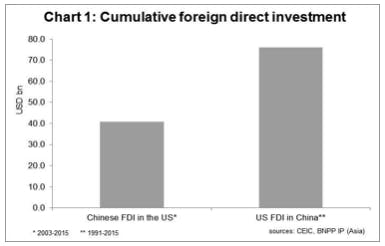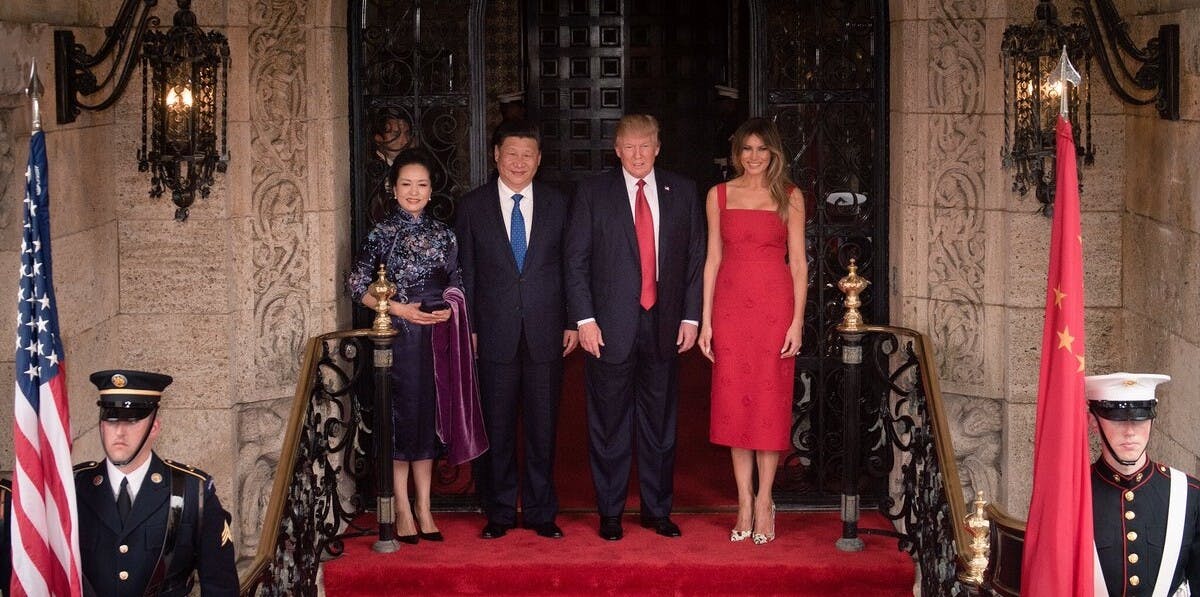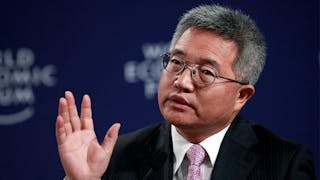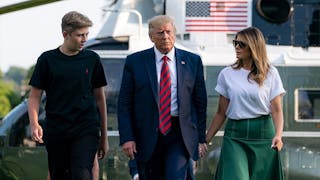The 1989 American romantic comedy film “When Harry Met Sally” raised the question “Can men and women ever just be friends?” and advanced many ideas about relationships. This backdrop seems to fit the Trump-Xi meeting held between 6th and 7th April. The question raised is: Can America and China ever just be friends? And post-meeting speculation abounds with what form of relationship will America and China have?
A benign start for Sino-US relations
On the back of a stable renminbi before the meeting, the lack of specific outcomes can be seen as an achievement by the two sides as it diffused the risk of the leaders pushing each other to make concessions on thorny issues such as trade, North Korea and the South China Sea. Even the US cruise-missile strike on Syria during dinner time in Florida did not upset the friendly atmosphere in which the two leaders appeared to develop a rapport. Trump also accepted Xi’s invitation to visit China later this year. This should give China face and allay fears that Xi went all the way to Florida to appease Trump and, hence, signal Xi’s political strength to his domestic audience.
The two sides agreed to a 100-day plan for trade talks aiming at addressing the large Sino-US trade surplus, and to establish a new negotiation framework, the US-China Comprehensive Dialogue, to be chaired by the two presidents for discussions on the economy, cyber-security, law enforcement and cultural and social issues. But there is a subtle aspect of this meeting that carries more importance than meets the eye.
The media and most analysts tend to emphasise the differences between Trump and Xi. Notably, Xi has risen to power as an appointed party cadre through meritocracy and has gained administrative experience through different levels of government. But Trump is a life-long businessman elected to become president with little political experience. They also have quite different temperament and communication styles.
However, when one analyses their similarities on the back of the personal rapport that they developed, the April meeting could well foster future Sino-US cooperation instead of clashes that conventional wisdom has it at this stage. Both are nationalists aiming at making their countries great again. Both have come to power by appealing to the public for change, in terms of anti-corruption in China and job creation and fairer trade in America. Both prefer to resort to executive orders when making decisions. On civil rights, both are seen as toeing a hard line against a free press (and even intellectuals in China’s case). Economically, both have prioritised domestic affairs but simultaneously tried to link internal challenges with foreign competition.
These similarities set the stage for the two leaders to break the ice when they met, as they shared personal experiences related to Sino-US relations. And personal relationship is no small matter, as it helps build mutual respect that contrasts sharply with Trump’s China-bashing rhetoric and Xi’s criticism of US foreign policy. To see this, consider the following.
Xi has personal ties with the US before he became China’s president. He studied modern agriculture in Iowa in 1985. His daughter graduated from Harvard in 2014 with a degree in psychology. His wife Peng Liyuan has worked extensively with US institutions and NGOs on poverty reduction, public health, orphan care and education. In particular, she has worked with the Bill and Melinda Gates Foundation on tuberculosis and AIDS prevention. She has also facilitated the establishment of the first overseas campus of America’s Juilliard School of performing arts in Tianjin (to be open in 2018).
For Trump, despite his harsh rhetoric against China, he nominated Iowa governor Terry Branstad as the ambassador to China. Mr. Branstad met Mr. Xi in 1985, when Xi was studying in Iowa, and they have kept their friendship for over three decades. So Trump’s nomination sent a signal about his desire to foster a workable relationship with Xi.
Trump’s five-year-old granddaughter has also served as a goodwill ambassador to China. She can sing Chinese songs and recite Chinese poetry in fluent Mandarin. Her videos of Lunar New Year greetings by reciting classic Chinese poetry was applauded by millions of Chinese both onshore and overseas early this year.
Ignoring these similarities between the two presidents is risking making a distorted assessment on the future Sino-US relationship. By getting “deeply acquainted”, establishing “a kind of trust” and building “an initial working relationship and friendship”, to quote President Xi’s comments after the meeting, the April meeting could well pave the way for Sino-US cooperation, although the process may not necessarily be smooth.
Trump faces the reality
To underscore this benign start of the new Sino-US relationship, Trump announced just a week after his meeting with Xi (on 12 April) that he would not label China a currency manipulator. To a large extent, such reversal of his position on the renminbi reflects the political reality that he is facing in the upcoming negotiations with the Chinese on various thorny issues. Trump’s imminent goal is reportedly to get China’s concessions on its huge trade surplus with America, North Korea’s nuclear programme and territorial disputes in Southeast China sea.
What are his and the Chinese strategic options?
On Trade
If Trump wants to cut America’s trade deficit with China by imposing high tariffs and forcing US and international manufacturers to move their production bases to America, he may not succeed for the obvious reason that such actions will trigger trade retaliation by China, which will hurt American exports to the Middle Kingdom. It will also raise sharply the prices of affordable products from China and hurt American consumption, especially the group of Americans who helped vote Trump into office.
If Beijing were to stretch the trade war to hit US foreign direct investment (FDI) in China, the US may have more to lose than China because it has far more FDI in China than China has in the US (Chart 1). This implies that the US does not have much leverage over China in a trade war. Trump may better try to persuade China to import more from the US. However, it will take China a long time to make that change. Meanwhile, Trump cannot force import quotas on US firms since America does not work on such a system and that will also invite Chinese retaliation.

On politics
Trump has also tried to use the trade issue to bargain with China for its help to rein in North Korea’s nuclear mischief. However, Xi may not necessarily buy it as strategic calculations suggest that Trump does not have the upper hand on trade. Xi may even take advantage of this and counter-bargain with Trump for scrapping the US’s deployment of the Terminal High Altitude Area Defense (THAAD) system in South Korea in exchange of China’s help to rein in Pyongyang. Trump may likely not buy this, though.
Even if he were to accept it, China might not be that influential on North Korea as he assumes. Pyongyang conducted its recent (22 March) nuclear missile test despite Chinese sanctions which have banned coal imports from North Korea. In fact, North Korea’s defiance of China’s influence dated back to 2006 when Pyongyang gave Beijing only a 20-minute warning of its nuclear test. It has since continued to call China’s sanctions and warnings bluffs and to emphasise its commitment on asserting Pyongyang’s sovereignty. The fact that there has been no official meeting between China’s Xi and North Korea’s Kim since the two leaders came to power (Xi in 2013 and Kim in 2011) is another sign of possible weakening of Chinese influence on North Korea.
Meanwhile, China’s strategic interest in North Korean may not necessarily aligned with that of the US. It does want to prevent a North Korean collapse. Economically, Beijing fears that a collapse would create a massive refugee problem with North Koreans flooding into China through the northeast provinces. Politically, however, Beijing does not want a unified Korea under US backing, which could align with Japan and form a strong US-led alliance against China. So it may want to keep a defiant North Korea within some limits so the country’s position as a buffer state to counter the US’s influence can remain.
China has also been assertive in its stance on the South China Sea and defined its claim as a “core interest”, implying that it would use force to defend its position there. Even with his “Asia pivot” policy, former US president Obama could not do anything to stop the Chinese from building up their strategic position in the South China Sea without risking a major military conflict. Trump is likely facing the same limitation (unless he wants war).
Under these circumstances, Xi may be unlikely to offer much strategic concession to Trump to contain the North Korean nuclear threat, and Trump may not have as strong bargaining power as he thought. Realising that his strategic options may be limited, Trump’s retreat from naming China a currency manipulator may be seen as an olive branch extended to China to build on the rapport that he developed with Xi in their first meeting to foster cooperation on wider strategic issues.
Trump should also appreciate a China ally in the face of rising tension with Russia over Syria and other strategic issues. Sino-US cooperation, if it plays out, is one less geopolitical risk for Trump and the markets to face.







































